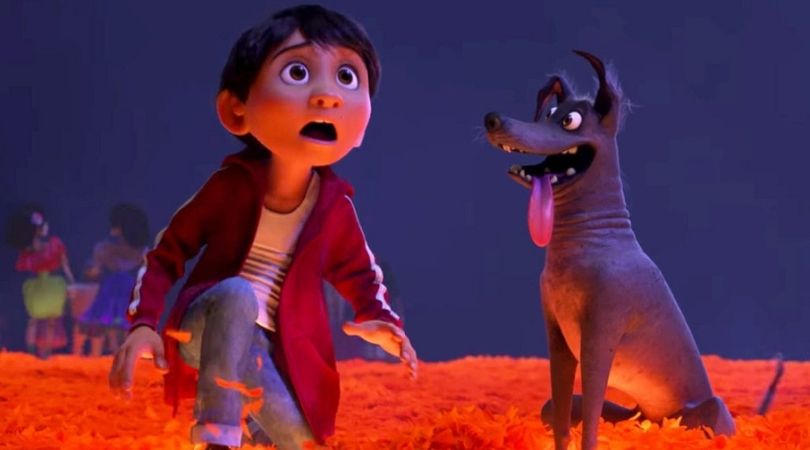
The Book of Life came out in 2014 and I wrote a blog about why you should watch that awesome movie instead of Disney Pixar’s Coco. However, as more information has come out, I’ve found myself conflicted. On one hand, here is a movie being put out by Disney that has a little brown boy as a lead, the voice cast is all Latinx, and it has the chance to increase Latinx visibility in a time where we are often the target of aggression in the political and private spheres.
But on the other hand, I seem to be one of the few people who didn’t post articles on Twitter celebrating its news and actually got in an argument in the thread of the Geeks of Color post because I will not forget that Disney tried to copyright “Dia de los Muertos.” I was told that this is small and they ended up backtracking, and because of all this, I should put my faith in Disney to bring Coco to life. But why? Name the last time you witnessed Mexicans in the spotlight of popular culture? Did the appropriation of Chola fashion the Day of the Dead parade in the most recent Bond movie come to mind, Gloria from Modern Family (I love her but still)? They should have. By and large, there is very little visibility for Latinx fans of pop culture, and when we do get stories representing us, we are almost always immigrants, hyper-sexual, and/or played by actors who have changed their names to fit be read as white by casting directors and fans alike. (Of course there exceptions like Jane (Jane the Virgin), Gus (The Strain), Cassian (Rogue One)) Sure we have Salma, Diego, Penelope, and some of the same names you hear all the time. But when it comes to how people see us, we’re always the immigrant.
Although I love seeing Dia de los Muertos in the mainstream, its detachment from its strong emotional and cultural meaning in Mexican and Mexican-American lives is removed, packaged, and worn as costumes. Although I’m excited for Coco, it is again a tale of someone in a small plain village in some part of Mexico who experiences the Land of the Dead. While this film can show the importance of the holiday to audience members of non-Mexican descent, it still casts the holiday as something other. We are still poor, plain, and not American.
Apparently, the director Lee Unkrich spent time in Mexico researching the movie — he’s white by the way, so that the script he wrote was “authentic.” This is yet another problem for me. To write about such an emotion series of days and concepts, why not hire a Mexican or Mexican American writer? That’s what made The Book of Life‘s story so special. Although Disney casted all Latinx voice actors and The Book of Life did not, the story being told through those actors is still a story told from the outside looking in. Lee wrote a dog into the script that isn’t a chihuahua, but instead a dog once revered by the Aztecs: the Xoloitzcuintle (or Xolo for short). Beyond this, it seems heavily influenced if not linked directly to the way the Mexican directed, written, and animated The Book of Life, I mentioned above. A boy told not to play music resists his family to pick up the guitar and then winds up exploring the land of the dead. The similarities are initially shocking.
In my last year in academia, I gave a lecture on Mexican American traditions to a class of majority-white students in Texas. The professor I was filling in forgave me the reading he assigned and I was taken aback that the site of study for Dia was San Antonio and yet it was explained as an immigrant celebration. We have always been here. Not every Mexican-American immigrated to the US and in places like Texas and California, we have long traditions that are worked into the very fabric of our cities. Not because Mexican immigrants came and changed the landscape but because Native Texans (Mexicans and indigenous tribes) created the landscape. So to see yet another character that is removed from this idea I was sad.
Articles and tweets have been made about how Coco is what we need in the time of Trump where Mexican-Americans and other Latinx communities are disparaged regularly. It was highlighted that we need a “love letter to Mexico.” But we don’t. We need a love letter to the Mexican-American experience that is not only shaped by immigration but also through a detachment from Mexico, a love letter to Spanglish and Tex-Mex food, a love letter to being too brown for the majority of Americans and yet too American for the groups we are lumped into.
The movie is scheduled to release on November 22 in the US and it may be great. But I won’t be hyped, I won’t forget what the studio has done, who has written it, or what it reinforces. We are more than Dia de los Muertos. We have always been here. and I am hoping Coco succeeds so that we can have studios telling our stories beyond this and as a part of the fabric of America as opposed to a culture entirely removed.






